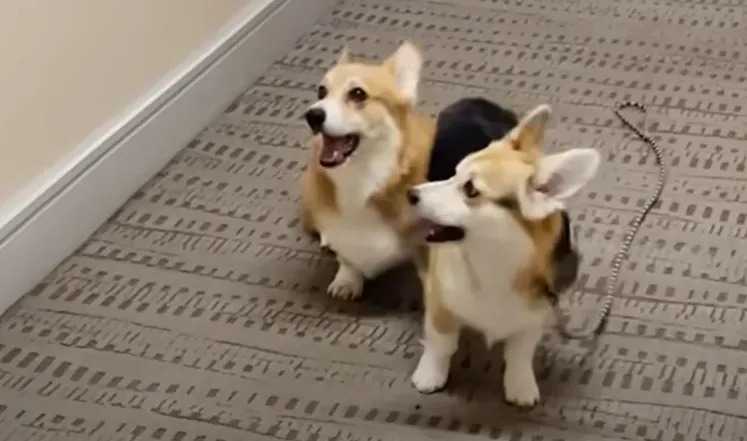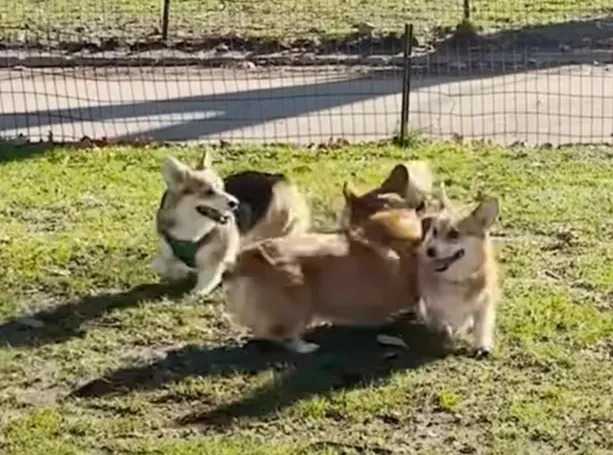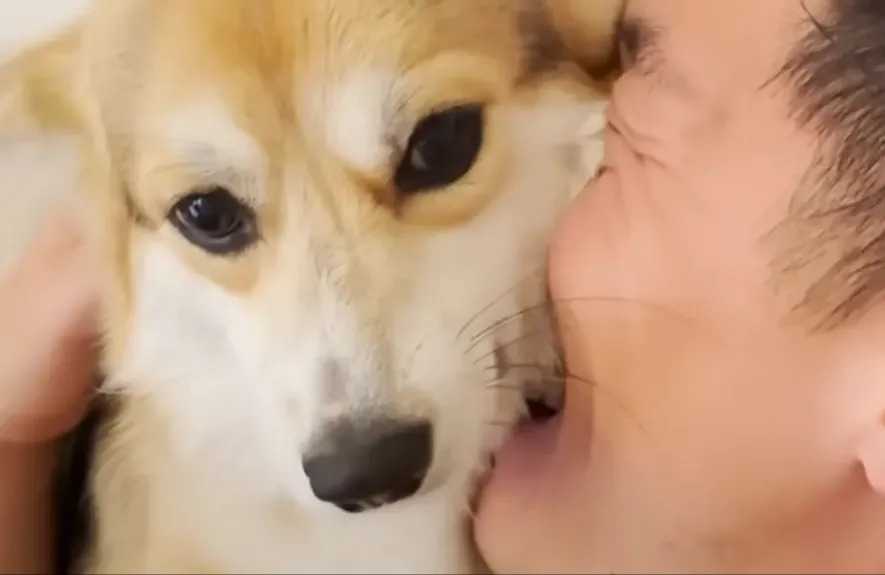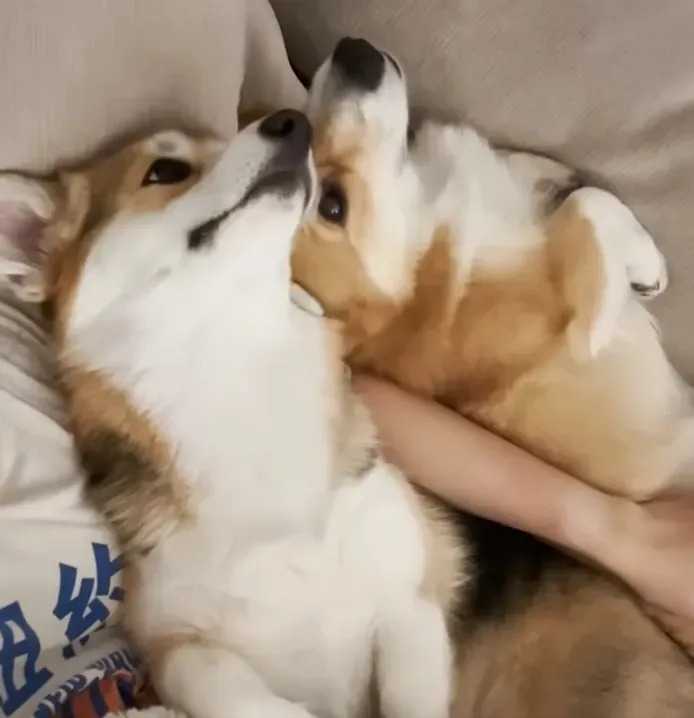Dash and Lily, two Pembroke Welsh Corgis residing under the same roof, couldn’t be more different. While both share the unmistakable charm and playful spirit of their breed, their personalities paint a delightful picture of opposites attracting.

Dash, the introverted one, marches to the beat of his drum. His idea of a perfect afternoon involves a solo game of fetch, the rhythmic thwap of the ball against the ground his soundtrack. Social interaction, particularly with other canines, often leaves him feeling overwhelmed. His owner’s initial attempt at introducing a companion to encourage socialization quickly turned into a failed experiment, with Dash retreating into his shell at the sight of another dog.

Lily, on the other hand, thrives in the company of others. This social butterfly is happiest when surrounded by fellow canines, her playful spirit infectious to all around her. Her participation in a corgi race is a testament to her love for the company of her kind.

However, even amidst the competitive spirit, Lily’s true colours shine through. A glance, a playful nudge, a sudden detour to greet a fellow racer – these are the moments that showcase her true, enthusiastic nature.

Their contrasting personalities create a dynamic that is both heartwarming and humorous. Dash’s moments of solitude, meticulously guarding his ball collection, are perfectly balanced by Lily’s bursts of playful energy, her unbridled enthusiasm for life evident in every wag of her tail.

Their story reminds us that even within the same breed, individual quirks and preferences can flourish. Dash and Lily, the introverted loner and the social butterfly, stand as a testament to the spectrum of canine personalities. They may be different as night and day, but their unique characters, woven together, create a beautiful tapestry of canine companionship.

Watch The Full Video Here:
If you’ve ever wondered why your furry friend seems to be a licking machine, you’re not alone. Dog licking is a common behavior that can leave many pet owners puzzled. From gentle licks to enthusiastic slurps, your dog’s licking habits can vary, but have you ever stopped to think about the reasons behind this slobbery behavior? It’s like they have an endless supply of kisses to give, but there’s more to it than just affection.
You may find yourself pondering, “Why does my dog lick so much?” Well, the answer might surprise you. While licking can be a sign of love and affection, there are other underlying reasons why dogs engage in this behavior. So, the next time your pup showers you with slobbery kisses, remember, there’s more to it than meets the eye.
Understanding Excessive Dog Licking
Reasons Behind Excessive Licking
Excessive dog licking can indicate various issues that your furry friend might be experiencing. It could be a sign of anxiety, boredom, allergies, or even a medical problem. If your dog is licking excessively, it’s essential to pay attention and try to identify the underlying cause promptly.
Anxiety and Stress
Dogs may lick excessively when they are anxious or stressed. Similar to how humans may bite their nails, dogs may resort to licking as a way to self-soothe. If your dog is constantly licking its paws or other body parts, it could be a signal that they are feeling anxious or stressed.
Medical Conditions
Certain medical conditions can also trigger excessive licking in dogs. Skin allergies, infections, or even pain could lead to increased licking behavior. It’s crucial to consult your veterinarian to rule out any underlying health issues causing your dog’s excessive licking.
Boredom and Habit
Sometimes, dogs may lick excessively out of boredom or habit. If your dog lacks mental or physical stimulation, they may turn to licking as a way to entertain themselves. Additionally, if licking has become a habit, breaking this pattern may require training and redirection.
Seeking Attention
Excessive licking can also be a way for your dog to seek attention. If your dog feels neglected or wants more interaction, they may lick excessively as a way to communicate their needs to you. Providing ample playtime and affection can help address this behavior.
Conclusion
Understanding why your dog is licking excessively is crucial for addressing the root cause of this behavior. Whether it’s anxiety, medical issues, boredom, or a cry for attention, observing your dog’s licking habits and seeking professional guidance can help ensure your furry companion’s well-being.
Common Reasons for Dogs Licking Too Much
Stress
Stress in dogs can lead to excessive licking. If your dog is feeling anxious or uncomfortable, they may resort to licking themselves as a coping mechanism.
Medical Conditions
Various medical conditions such as allergies, infections, or skin issues can cause your dog to lick excessively. It’s essential to have your furry friend checked by a veterinarian to rule out any underlying health issues.
Boredom
Dogs may lick themselves excessively out of boredom. Ensuring your dog gets enough physical exercise, mental stimulation, and attention can help alleviate this behavior.
Attention-Seeking
Some dogs lick excessively to gain attention from their owners. If your dog feels neglected or wants more interaction, they may resort to licking as a way to seek attention.
Habit
Excessive licking can become a habit for some dogs. It’s important to identify when the licking behavior started and whether any triggers or events may have contributed to its development.
Skin Irritation
Skin irritation or discomfort can also lead to increased licking in dogs. Check for any signs of irritation, redness, or inflammation on your dog’s skin that may be causing them to lick excessively.
Diet
In some cases, dietary deficiencies or intolerances can manifest as excessive licking behavior in dogs. Consult with your vet to ensure your dog’s diet is appropriate and meets their nutritional needs.
Environmental Factors
Environmental factors such as changes in routine, new household members, loud noises, or unfamiliar scents can trigger stress in dogs, leading to excessive licking behaviors.
Lack of Exercise
Insufficient physical activity can result in pent-up energy in dogs, leading to restless behaviors like excessive licking. Making sure your dog gets enough exercise can help manage this behavior.
Grooming
Dogs may lick themselves excessively as a part of their grooming routine. While grooming is normal, excessive or obsessive licking may indicate an underlying issue that needs attention.
Tips for Managing Your Dog’s Excessive Licking
1. Identify Triggers: Start by observing when your dog licks excessively. Note down the situations, people, or places that seem to trigger this behavior. Understanding the triggers can help you address the root cause.
2. Consult a Veterinarian: If your dog’s licking is persistent and you suspect it may be due to a medical issue, consult a veterinarian. They can perform an examination to rule out any underlying health concerns.
3. Provide Mental Stimulation: Dogs may lick excessively out of boredom or a lack of mental stimulation. Engage your dog with interactive toys, puzzles, or training sessions to keep their mind occupied.
4. Improve Grooming Routine: Ensure your dog’s grooming routine is adequate. Regular baths, brushing, and keeping their coat clean can reduce skin irritation that may be causing them to lick excessively.
5. Adjust Diet: A balanced diet is essential for your dog’s overall health. Consult your veterinarian to ensure your dog is getting the right nutrients. Dietary deficiencies can sometimes lead to excessive licking.
6. Be Patient: Changing behavior takes time. Be patient and consistent in your approach to managing your dog’s excessive licking. Celebrate small improvements along the way.
7. Provide Distractions: Redirect your dog’s licking behavior by offering alternative activities such as playtime, walks, or chew toys. Distracting them can help break the licking habit.
8. Create a Safe Environment: Ensure your home environment is safe and free from potential hazards that could be causing stress or triggering your dog to lick excessively.
9. Use Positive Reinforcement: When your dog refrains from excessive licking, reward them with praise, treats, or extra attention. Positive reinforcement can help reinforce good behavior.
10. Seek Professional Help: If your dog’s excessive licking persists despite your efforts, consider seeking the help of a professional dog behaviorist or trainer. They can provide personalized guidance and support.
Remember, each dog is unique, so it may take some time to find the right combination of strategies to effectively manage your furry friend’s excessive licking. Patience, consistency, and love are key in helping your dog lead a happy and healthy life.
Conclusion
So, there you have it – the reasons why your dog might be licking so much. From stress to medical issues to just wanting attention, there are various factors at play. Remember, every dog is different, so it’s essential to be patient and understanding. By following the tips mentioned, like identifying triggers, consulting a vet, and providing mental stimulation, you can help manage your pup’s licking habits. Just remember to show them love, be consistent, and create a safe and happy environment for your furry friend. With a little patience and care, you can ensure your dog lives a healthy and joyful life.
Frequently Asked Questions
Why does my dog lick excessively?
Dogs may lick excessively due to stress, boredom, attention-seeking, allergies, medical issues, or lacking mental stimulation. Understanding the underlying cause is crucial for addressing this behavior.
How can I manage my dog’s excessive licking?
You can manage excessive licking by identifying triggers, consulting a veterinarian for medical issues, providing mental stimulation, adjusting diet, improving grooming routines, being patient, offering distractions, creating a safe environment, using positive reinforcement, and seeking professional help if needed.
What is the importance of addressing excessive licking in dogs?
Addressing excessive licking in dogs is vital for their well-being and quality of life. It helps prevent potential health issues, improves their behavior, and strengthens the bond between you and your furry companion.